
Ready to give readers a break? Great vision doesn’t have to end in your 40s. Call 808-949-2662 to schedule a contact lens appointment today and ask your eye doctor about ACUVUE® OASYS MAX 1-Day MULTIFOCAL Contact Lenses

Ready to give readers a break? Great vision doesn’t have to end in your 40s. Call 808-949-2662 to schedule a contact lens appointment today and ask your eye doctor about ACUVUE® OASYS MAX 1-Day MULTIFOCAL Contact Lenses
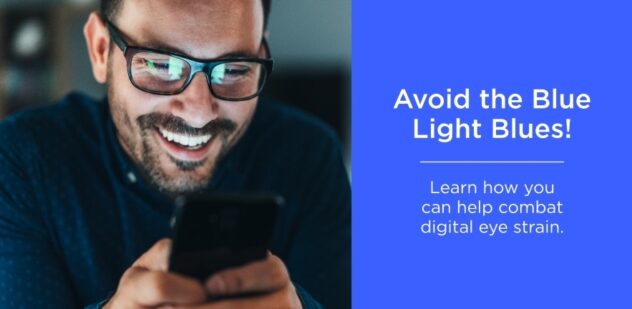
Did you know digital devices emit blue light and blue light exposure may contribute to digital eye strain? Here are a few tips to help keep your eyes healthy:
Make an appointment today if you’re concerned about blue light exposure and digital eye strain.
Schedule Your Eye Exam Now Your eye health plays a huge role in your overall well being. And even though vision and health changes can happen at any age, we often take our eyesight for granted until it’s too late. It can be hard to imagine what it would be like to lose your vision.
Your eye health plays a huge role in your overall well being. And even though vision and health changes can happen at any age, we often take our eyesight for granted until it’s too late. It can be hard to imagine what it would be like to lose your vision.
One way to keep your eye health top of mind is by learning about different eye diseases and conditions.To give yourself the best chance at catching one of these eye diseases early, schedule regular eye exams with us. We can discuss how wearing sunglasses, resting your eyes, eating well and being active can also play an important role in keeping your eyes healthy and promoting overall wellness.
Choosing to focus on your eye health could lead to improvement in your overall health and wellness so schedule an appointment today!
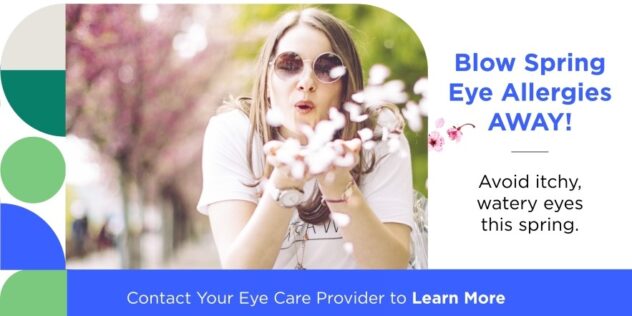
High levels of pollen, mold, dust, and other irritants can make for miserable eyes! These airborne allergens may be the primary culprit of watery, itchy eyes, but relief may be closer than you think. Check out these do-it-yourself remedies for mild cases of seasonal allergies.
Don’t let allergy season get you down. Talk to your eye doctor about more ways to combat eye allergy symptoms this spring!
Book Your Eye Exam Online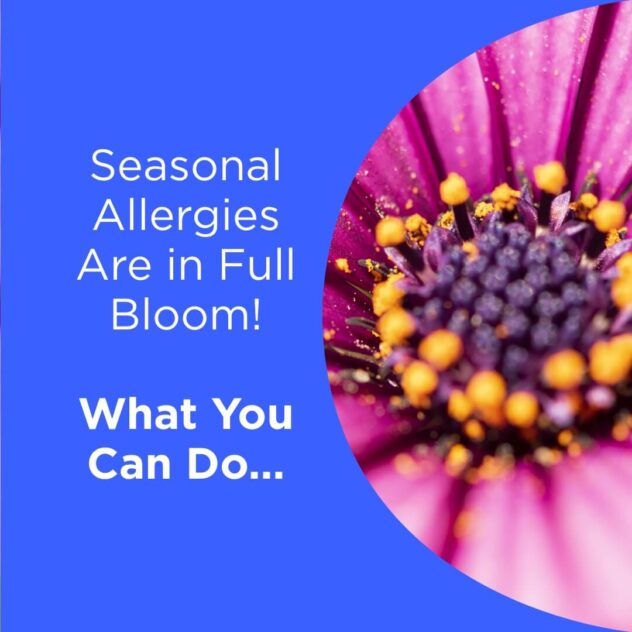 Even before we see the sunny weather, blooming flowers, and greening trees, there are a few sure signs that spring is near. You’re more likely to feel the season change versus seeing it with your own eyes. The problem is, sometimes, it’s your eyes that get hit the worst with the first signs of spring.
Even before we see the sunny weather, blooming flowers, and greening trees, there are a few sure signs that spring is near. You’re more likely to feel the season change versus seeing it with your own eyes. The problem is, sometimes, it’s your eyes that get hit the worst with the first signs of spring. Women are more likely than men to suffer from eye-related disease and conditions such as: Cataract, Glaucoma, and Age-related macular degeneration (AMD). Ladies, stay ahead of your eye health and schedule your annual exam today! #Women’sEyeHealth
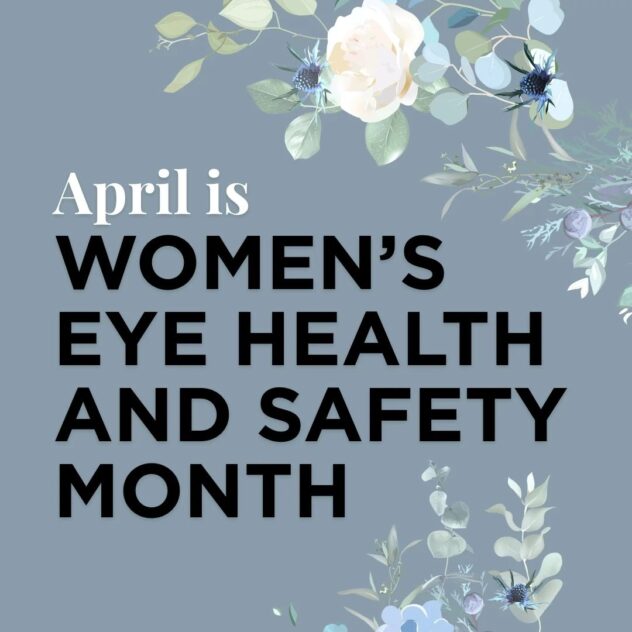
 When it comes to really seeing what’s going on with your eyes, there is no substitute for a comprehensive, yearly eye exam by our eye doctors. Despite catchy claims, there is truly no ‘app’ for that. While a variety of new mobile applications claim to evaluate vision or the fit of eyeglasses, often these apps give inaccurate or misleading information, and misinformed consumers end up delaying essential, sight-saving exams. Early diagnosis and treatment are critical and can often prevent a total loss of vision and improve quality of life. Get your eyes check annually.
When it comes to really seeing what’s going on with your eyes, there is no substitute for a comprehensive, yearly eye exam by our eye doctors. Despite catchy claims, there is truly no ‘app’ for that. While a variety of new mobile applications claim to evaluate vision or the fit of eyeglasses, often these apps give inaccurate or misleading information, and misinformed consumers end up delaying essential, sight-saving exams. Early diagnosis and treatment are critical and can often prevent a total loss of vision and improve quality of life. Get your eyes check annually.
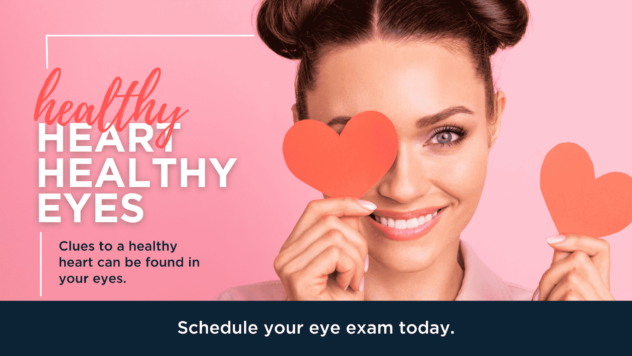
Did you know your eyes may help show how healthy your heart is? A yearly eye exam does more than check your vision – it can help detect signs of chronic conditions like high blood pressure or diabetes that could lead to heart disease.
Schedule a comprehensive eye exam so we can keep your heart pumping and your eyes seeing. And in the meantime, here are 5 things you can start doing today to show your eyes and your heart more love:
Schedule an appointment today!
Schedule Your Eye Exam Now
Did you know that Glaucoma is the second-leading cause of vision loss and blindness? According to the Center for Disease Control and Prevention, there are more than 3 million people affected by the disease in the U.S. today, and that number is expected to reach 4.2 million by 2030.
It’s important to know some of the potential risk factors for glaucoma, which include:
For those at risk of developing glaucoma, the American Optometric Association recommends an annual comprehensive eye exam. Early detection through regular eye exams, is the key to protecting your vision from damage caused by glaucoma.
Has it been a while since your last comprehensive eye exam? Give us a call to schedule one today!

Here are some healthy vision tips from Dr. Dan an Dr. Tracie
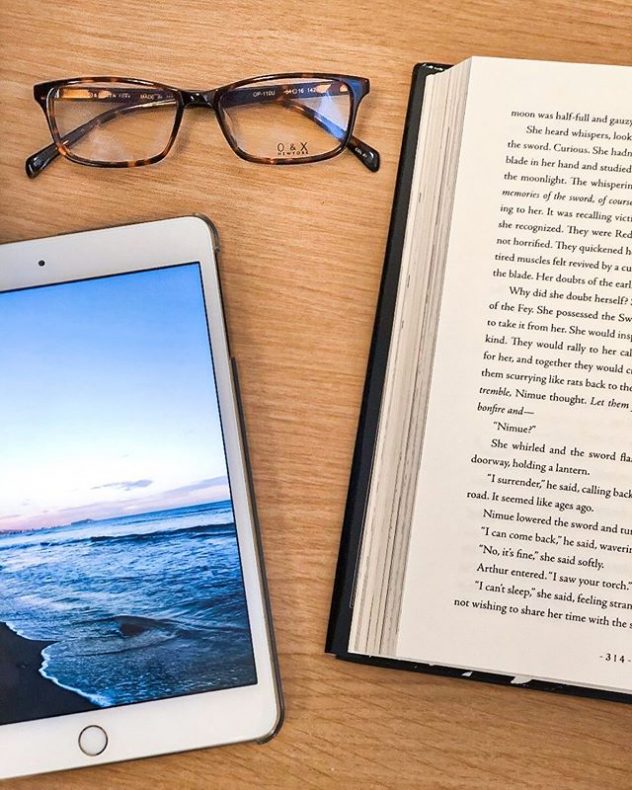 Our optometrist, Dr. Tracie Inouchi recommends the following tips to reduce digital eye strain.
Our optometrist, Dr. Tracie Inouchi recommends the following tips to reduce digital eye strain.
Whether you’re goblin or ghoul, vampire or witch, poor costume choices—including decorative contact lenses and flammable costumes—and face paint allergies can haunt you long after Halloween if they cause injury.
Enjoy a safe and happy Halloween by following the guidelines from FDA, the Consumer Product Safety Commission, and the Centers for Disease Control and Prevention:
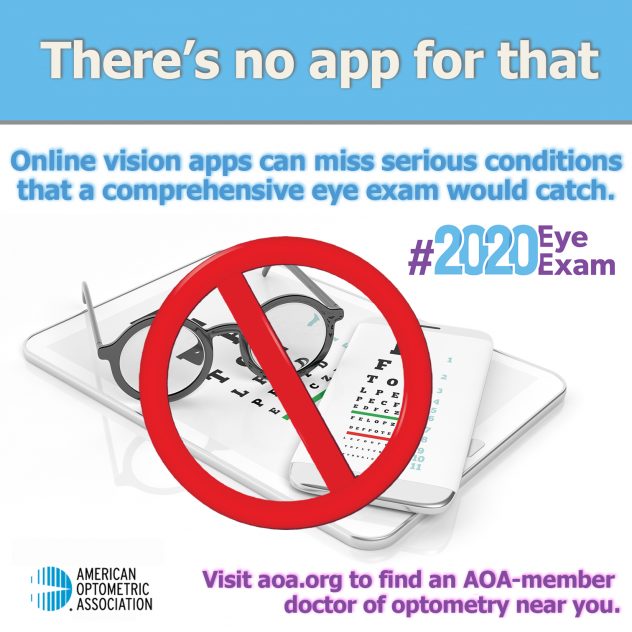
Glaucoma? Cataracts? Diabetic Eye Disease? There’s no app for that. Online vision apps can miss serious conditions that a comprehensive eye exam would catch. #2020EyeExam Schedule your eye exam with Dr. Tracie Inouchi or Dr. Dan.
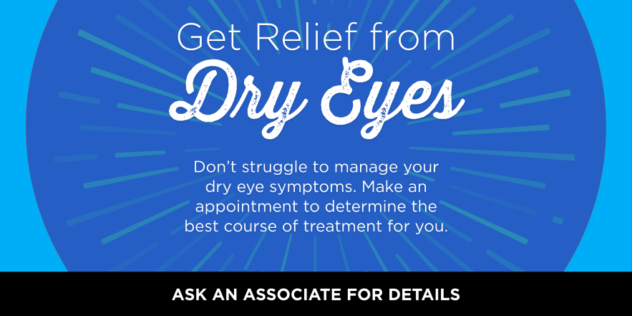
Are you experiencing a stinging, burning scratchy feeling in your eyes, or a sensation that you have something in your eyes, have difficulty wearing contact lenses, or driving at night? These could all be symptoms of dry eyes. Dry eyes can be incredibly uncomfortable to live with day-to-day. According to the Mayo Clinic, dry eye syndrome could be the main source of symptoms—it occurs when your supply of tears becomes insufficient in lubricating and nourishing your eyes. Although it can happen at any age, typically dry eye syndrome happens over time and most commonly in people over 40.
However, there may be other culprits for your dry eyes that are not directly connected to dry eye syndrome according to the American Optometric Association. Reasons for your eyes to feel dry could include:
As you can see the causes range from minor to more challenging. If you suspect you may have dry eye syndrome or any of the above causing your dry eyes, it’s best to visit your eye doctor to explore options. During your eye exam, your doctor can check for vision problems and signs of health conditions that could result in dry eyes. An accurate diagnosis is important!

Got our ? on the weekend!! Hope you’re all staying safe and healthy. . . . #alohafriday #tgif #eyesontheweekend #frozenyogurt #fruitygoodness #instagood #weekendmood #alamoana #oahuhawaii #optometry #hawaiioptometrist #2020vision #hawaiilife #instahawaii #hawaiieats